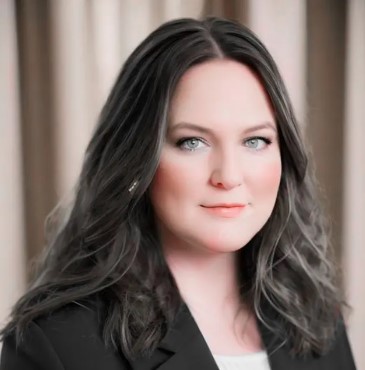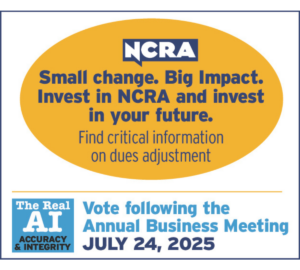Everyone is a mentor
By Meredith Seymour
Amanda Lunde, a freelancer from Verona, Wis., has leaned into the support she’s found at her new firm, her state and national associations, and her professional community. “Everyone I’ve ever asked for help or advice has been so supportive and excited to help me,” she says.
JCR | What do you enjoy most about court reporting?
AL | I love the flexibility in my schedule that freelance allows. I love that a day when I get up early and drive to a law firm out of town for a deposition can be followed by a day at home editing or a day with a Zoom job in the afternoon, and no two jobs are alike. Coming from a salaried position with a lot of overtime expectations, I also love the idea of more work actually equals more money!
One thing that I think is really special about this career is how supportive and kind everyone is. That is not the case in every job or industry out there! I also feel valued as a person and as an employee which is something I was really looking for when I left my old career, and I definitely found it in this community.
JCR | How did you feel both going into your first assignment as a reporter and coming out of it?
AL | Obviously, going into my first solo job, I was terrified! I had done everything I could to prepare, but I just felt like something would still go wrong. I hoped my fingers wouldn’t freeze and it wouldn’t be too obvious that it was my first time.
Coming out of it, I felt tremendous relief. I knew my transcript wasn’t perfectly clean, but after the first few questions and answers, I settled into the groove and just did my job. I gathered all of my exhibits, got everyone’s transcript order, and nobody asked me if I was sure I was really the court reporter or if it was my first day. When I got home and the nervous energy wore off, I was completely exhausted, but I felt good about my ability to do this job.
JCR | What did you do to remain positive and motivated as a student?
AL | If I needed a day off during school, I would absolutely take one. Taking a break is not the end of the world, and sometimes it even helps you come back stronger. I learned a lot about how rest is critical for your brain to make new connections and synthesize things that you’re learning, so sometimes your worst days are when you’ve been going really hard for too long.
JCR | What was the hardest part of transitioning from school to the real world?
AL | Advocating for yourself when people are speaking too quietly or all at the same time or when they tell the witness they can log off the Zoom before you’ve asked for spellings or any of those situations. It’s hard to shake the feeling that it’s my own fault for being really new, but making a clear transcript is a team effort.
JCR | Do you have any advice for reporting students?
AL | Don’t be afraid to reach out to anyone in this industry! Everyone I’ve ever asked for help or advice has been so supportive and excited to help me. Having those contacts will also be indescribably valuable to you when you’re booted out into the real world and you have obscure questions.
Also, there are so many people who think they have the “one true formula for success” (practice “X” hours per day, etc.), and it just isn’t a one-size-fits-all kind of thing. If you find a smart practice schedule that works for you, you will still be successful even if you don’t have hours upon hours a day to devote to your machine.
JCR | What’s your “can’t live without” item in your steno bag?
AL | Snacks (usually some kind of energy bar) are a lifesaver when a job goes a little longer than anticipated. I also really love the Velcro cord protector that I bought on Amazon. It sticks to office carpeting and stops people from tripping on my power cord and then it rolls up in my bag and I think it looks more professional than loose cords.
JCR | Where’s your favorite place to edit?
AL | I really love my home office! I set it up and decorated it while I was in school, and it’s great for editing and Zoom depos. I also like to go to a coffee shop for some ambience when I feel like getting out of the house.
JCR | Do you have a mentor?
AL | The freelance firm I work for, For the Record in Waunakee, Wis., came with built-in mentors! I could not have asked for a better, more supportive experience coming into a brand-new job. I think everyone there has been a mentor to me at some point throughout my internships last fall and my first six months with the firm, and I hope to follow in their absolutely awesome footsteps.
JCR | What is your next goal? What is a long-term goal?
AL | The RPR is next on my list to finish. Somehow those tests are so much harder than passing the same speeds in school!
Long term, I’d like to clean up my writing and go for the CRR to add realtime to my menu of skills.
JCR | How has involvement with state and national reporting associations benefited your career thus far?
AL | When I was a student, the associations were wonderful for helping me get started, finding a good school, learning about career options, getting scholarships, and all of that. The events put on at NCRA and WCRA conventions for students always gave me such a boost afterward, and I would usually pass a new speed after attending.
Now that I’m working, I find that networking with other people who understand what your job really entails and what it’s really like to go through school has been invaluable. Even just giving us a place to gather to share tips, tricks, wins, and struggles is a big benefit. I also enjoy hearing about the ways that the associations are trying to help us as an industry by reducing some of the extra barriers to certification and helping us form a united front against any attacks on court reporters across the country.
Amanda Lunde is a freelancer from Verona, Wis. She can be reached at amandaklunde@gmail.com.
Meredith Seymour is an official from Madison, Wis. She can be reached at m_hinck@yahoo.com.



